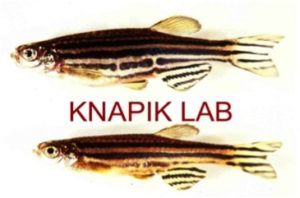Research
Understanding mechanisms of protein transport and secretion through modeling of human diseases
The Knapik laboratory uses in vivo approaches in zebrafish (Danio rerio) to model and manipulate the genetic and developmental processes that underlie the pathophysiology of human disease. We use genetic mutations induced by CRISPR/Cas9 genome editing or chemically-induced random variants to assess disease phenotypes, gene function, and pathway interactions. In parallel with the zebrafish models of human diseases, we also use mammalian cell culture and biochemical approaches.
We have focused our research on three main areas:
- The mechanisms and pathways directing extracellular matrix traffic and deposition
- The pathophysiology of human diseases, including developmental and neuropsychiatric disorders
- Modeling human variants for drug development and testing
Our laboratory is actively seeking motivated individuals to contribute to our work in an effort to better understand how disruptions in basic cellular and developmental processes can cause human diseases, including developmental and neuropsychiatric disorders.
Rotation Projects
- Modeling of human diseases, analysis of craniofacial malformations as comorbid phenotypes to neuropsychiatric disorders
- Validation of BioVU phenome findings through modeling in zebrafish (disease gene discovery)
- Investigation of cargo selection by inner COPII coat component, Sec24D during brain development
- Analysis of neural phenotypes in CATIFA syndrome-linked ric1 mutant models
- Investigation of cerebellum and forebrain development in ric1-/- zebrafish embryos
- Analysis of neuromuscular junction and muscle morphology in ric1-mutant models by whole-mount immunofluorescence and confocal microscopy
- CRISPR/Cas9 Knock-In approach to introduce CATIFA patient variant to zebrafish ric1 locus
- Investigation of Neuromuscular Transmission Defect (myasthenia)-linked GFPT1 mutations
- Characterization of zebrafish gfpt1 (glutamine-fructose-6-phosphate transaminase 1) genetic mutants through multi-tissue imaging analyses of cartilage, muscle and neurons
- Functional validation of myasthenia patient variants by microinjection of mRNAs
- Generation of gfpt1 mutant alleles via CRISPR/Cas9 genome editing
